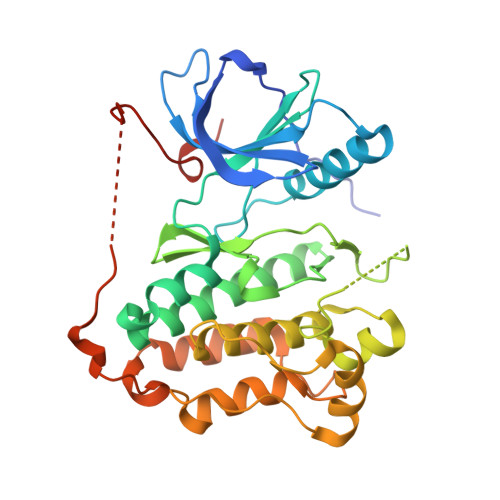Development of covalent inhibitors that can overcome resistance to first-generation FGFR kinase inhibitors.
Tan, L., Wang, J., Tanizaki, J., Huang, Z., Aref, A.R., Rusan, M., Zhu, S.J., Zhang, Y., Ercan, D., Liao, R.G., Capelletti, M., Zhou, W., Hur, W., Kim, N., Sim, T., Gaudet, S., Barbie, D.A., Yeh, J.R., Yun, C.H., Hammerman, P.S., Mohammadi, M., Janne, P.A., Gray, N.S.(2014) Proc Natl Acad Sci U S A 111: E4869-E4877
- PubMed: 25349422
- DOI: https://doi.org/10.1073/pnas.1403438111
- Primary Citation of Related Structures:
4QQC, 4R5S, 4R6V - PubMed Abstract:
The human FGF receptors (FGFRs) play critical roles in various human cancers, and several FGFR inhibitors are currently under clinical investigation. Resistance usually results from selection for mutant kinases that are impervious to the action of the drug or from up-regulation of compensatory signaling pathways. Preclinical studies have demonstrated that resistance to FGFR inhibitors can be acquired through mutations in the FGFR gatekeeper residue, as clinically observed for FGFR4 in embryonal rhabdomyosarcoma and neuroendocrine breast carcinomas. Here we report on the use of a structure-based drug design to develop two selective, next-generation covalent FGFR inhibitors, the FGFR irreversible inhibitors 2 (FIIN-2) and 3 (FIIN-3). To our knowledge, FIIN-2 and FIIN-3 are the first inhibitors that can potently inhibit the proliferation of cells dependent upon the gatekeeper mutants of FGFR1 or FGFR2, which confer resistance to first-generation clinical FGFR inhibitors such as NVP-BGJ398 and AZD4547. Because of the conformational flexibility of the reactive acrylamide substituent, FIIN-3 has the unprecedented ability to inhibit both the EGF receptor (EGFR) and FGFR covalently by targeting two distinct cysteine residues. We report the cocrystal structure of FGFR4 with FIIN-2, which unexpectedly exhibits a "DFG-out" covalent binding mode. The structural basis for dual FGFR and EGFR targeting by FIIN3 also is illustrated by crystal structures of FIIN-3 bound with FGFR4 V550L and EGFR L858R. These results have important implications for the design of covalent FGFR inhibitors that can overcome clinical resistance and provide the first example, to our knowledge, of a kinase inhibitor that covalently targets cysteines located in different positions within the ATP-binding pocket.
- Departments of Biological Chemistry and Molecular Pharmacology, Departments of Cancer Biology and.
Organizational Affiliation:

















